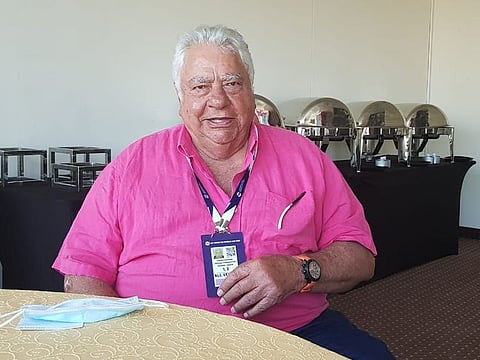ICC T20 World Cup: I would have been in big demand in franchise cricket, says Farokh Engineer
Legendary Indian keeper-batsman recalls twin series wins in 1971 on it’s 50th anniversary

Dubai: The last person one would expect in the broadcasters’ box for a T20 World Cup game is Farokh Engineer, the legendary Indian wicketkeeper-batsman of the Sixties and Seventies. However Engineer, now all of 83, has an open mind about the shortest format of the game where many feel he would have been a big hit with his rugged good looks and flamboyance.
‘‘I love this format as I find it extremely enjoyable and entertaining. This World T20 has been huge success. Yes, Test cricket - which is like a game of chess - is always the ultimate for me but then T20 is what is keeping the economy of the game running,’’ said Engineer.
A UK resident for decades and one of the eminent citizens of Lancashire, a county of which he is one of the vice-presidents, the octogenarian and his wife are in the emirate were on a vacation to be with their youngest daughter Scarlette when he was approached by the Dubai-based Channel 2 Group to join their radio commentary team along with Sir Clive Lloyd. Speaking to Gulf News during an exclusive chat on the sidelines of the second semi-final in Dubai, Engineer said he would have loved to have a go in franchise cricket if born in this era.
‘‘See, I once got to 94 before lunch against the West Indies, which then boasted of some of the most fearsome fast bowlers in their ranks. My philosophy was simple - if a fast bowler has a ball in hand, I also had a bat in my hand with which I can send you to places in the park you could never imagine.
‘‘Sunil (Gavaskar), my opening partner, always says that I would have been done well in the shortest format - something which Sachin Tendulkar and MS Dhoni also say whenever they meet me,’’ he says.
The sense of occasion of meeting Engineer during 2021 could not be lost on one as this year marks the 50th anniversary of India’s twin Test series wins abroad in England and West Indies in 1971. It was a watershed moment for Indian cricket under the leadership of late Ajit Wadekar and is considered as their coming of age, though their label of ‘not travelling well’ continued for decades till recent years.
Looking back, Engineer offered an interesting anecdote. ‘‘I was supposed to be that captain of the Indian team in England but then, Vijay Merchant dropped me and Tiger Pataudi as they found us too flamboyant. However, I was then playing county for Lancashire and since they released me for the Tests, I was eventually made a part of the squad. I would like to feel that together with Sunny, we made a difference in both series wins and put India on the cricketing map,’’ he said.
A member of a different generation when they used to get Rs 50 (two dirhams fifty fills approximately) per day for a Test match, Engineer does not see anything wrong in the modern Indian cricketers making the mega bucks. Striking a pragmatic note about the volume of cricket for Indian cricketers these days. he said: ‘‘See, it’s very difficult to strike a balance. It’s about big money and I feel you shouldn’t complain about playing more. The only thing I would like them to remember is that playing for the country should be the top priority.’’
Lauding the good work done by the regime of Ravi Shastri and Virat Kohli, Engineer felt they were leaving it in very good shape. ‘‘India has so much bench strength - there are likes of experienced players like Shikhar Dhawan, Bhuvaneshwar Kumar who one the sidelines.
Finally, batsman-wicketkeeper or keeper-batsman or - what’s his preference? ‘‘A lot of the new breed has to do with proliferation of white ball cricket, now it’s batsmen who keep wickets. The likes of Rishabh Pant, Jos Buttler are quickscoring batsmen first who kept wickets - someone like Dhoni used to snatch the ball when he came, but he had improved tremendously. Wriddhiman Saha is one whom I would call a keeper-batsman.’’
‘‘My vote, of couse, will go for the wicketkeeper-batsman,’’ he signed off.
Sign up for the Daily Briefing
Get the latest news and updates straight to your inbox



